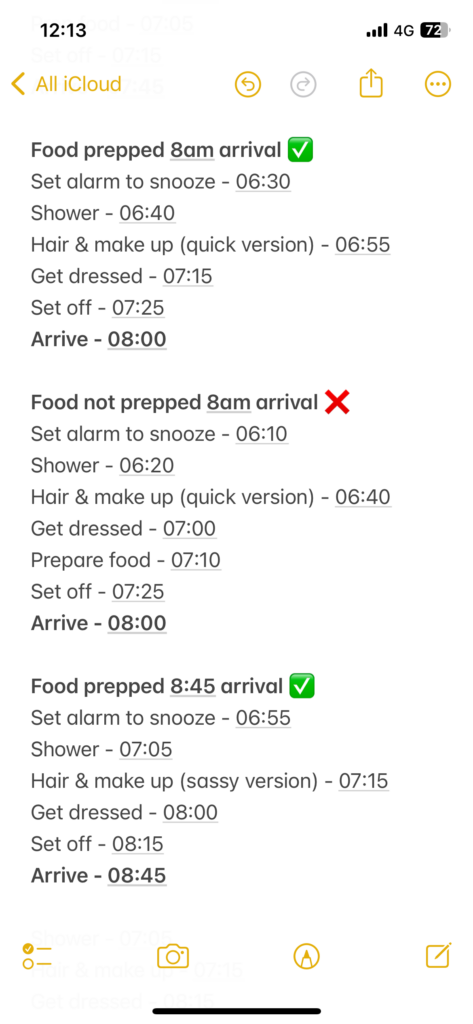It’s hard to believe that six years have passed since I last wrote a professional blog for IFP – time truly flies! Some may know I also keep a personal blog (www.ftdandme.co.uk) where I share my journey and experiences with Frontotemporal Dementia, so I’m certainly in my comfort zone as I prepare for the task. While my personal blog remains a passion of mine, I can’t deny I’m excited to focus on something new (and anyway, my career is another passion of mine!).
I’ve had a 14-year journey with IFP (it’s my work birthday TODAY! 22/3/24), starting as the first apprentice in 2010 and now a current director/shareholder, specialising in Business Development. Climbing the career ladder in any firm is a journey marked by challenges, and for me, the most significant test was finding the right work-life balance that suited my needs.
Disclaimer – just because I’m writing this article doesn’t mean I have it all figured out. In fact, I believe everyday life is outright difficult. Full-time working, studies on the side, having a family, socialising, self-care, keeping a well-kept home, cooking (and everything else) requires superhuman organisation to complete. I only know a few people with superhuman organisation skills, but if you’re one of them reading this, you’re my idol.
I was, unfortunately, given a few different attributes which means getting my ducks in a row requires some creativity. For example:
- Being easily distracted
- Lack of consistency
- Fluctuating motivation
- Poor time management
Despite these helpful (cough) characteristics of mine, I have found ways to navigate life which means I’m content and productive in both a work and personal capacity (most of the time). Of course, everyone is different, and my tips and tricks won’t work for everyone (actually, they’ll probably only help if you’re a bit like me!).
The Underlying Problem
To put simply, there is no way I can flourish in my personal life if I’m behind at work. I’ll think and even dream about what I haven’t done, meaning I won’t get enjoyment in any other task. Likewise, I can’t flourish at work if I’m behind on ‘life-admin’. When one aspect falls behind, it can have a ripple effect on the other. Only by establishing a baseline equilibrium in both scenarios allows me to be in the moment, both professionally and personally.
The WFH vs Office Debacle
Working from home (WFH) has become way more popular for both employers and employees of late, which of course can be a great thing… for some. Be honest with yourself and ask this question – where are you most productive? For someone like me (who can get easily distracted and dip motivation), being at home all the time only contributes to the underlying problem above. Whilst it has its benefits, I had to introduce boundaries:
- Limit my WFH days (twice per week for example).
- Have a designated ‘work area’ at home, away from any distractions.
Without these limits, I slip into bad habits (like emptying the dishwasher because it’s near me, which means I must clean the kitchen whilst I’m at it… and so on). I need to compartmentalise my professional and personal life, and working from home, if not done properly, can really blur the lines.
Get Your Head in The Game
Once you can separate your professional and personal life and focus on the task in hand, it can boost productivity. Bonus – when you’re productive in one area of your life, it tends to spill over into other areas. Extra bonus – completing tasks creates a positive feedback loop, which means you’re then more productive and thus free from the pressures of deadlines or unfinished business! If you haven’t guessed already, all of this addresses the underlying problem and allows you to enjoy the moment, contributing to a healthy work-life balance. ‘Getting your head in the game’ is a positive mindset, encouraging you to focus and become mentally prepared to smash your days’ work – leading to the mighty outcome of 💕 productivity 💕.
Be Brave
Even when people are in a strong position at work and productivity is shining, some still struggle to dedicate time to their personal lives. I’ve even heard people say they feel ‘guilty’, or they’re ‘scared’ of striking this balance in case they appear selfish or like they’re not working hard enough. This appears to be very common in millennials and could be a generational trend, but I’m sure others have felt it at least once in their life, especially if working in a culture which prioritises availability. Of course, there is tons of research evidencing why prioritising your own well-being only contributes to productivity at work, but it’s still a barrier for some. This is where you must be brave.
For some people, this could mean:
- Going on annual leave and not checking your emails.
- Being unavailable outside of working hours.
- Setting clear boundaries that your peers are aware of.
- Utilising flexible work arrangements.
- Seeking support and recognising when you need help.
Being brave doesn’t just stop in the workplace. In your personal life, this could mean:
- Trying something new.
- Prioritising self-care.
- Saying yes (or no) to social commitments.
- Investing in yourself; be it through education, exercise, travel etc.
- Again, seeking support and recognising when you need help.
In this article, I’ve covered the underlying problems which stop me achieving a work-life balance and touched on the mindset needed to find a solution. However, I’m aware I haven’t addressed my own challenging attributes and how I deal with these. This is mainly because what works for one person might not work for another, but if you’ve made it this far, chances are you can relate to what I’m saying. So, let me share a few of my own tactics in the hopes they help you too. I know, some of these are weird.
Being easily distracted
This is by far the thing I struggle with most. Here are some of the things I try (‘try’ being the key word) to keep me focussed:
- Put my earphones in to block out distracting sounds.
- Ensure my work area is tidy and free from distractions – ‘messy desk, messy mind’ and all that.
- Take regular breaks after each task to prevent burnout.
There’s a problem, though. What works one day, will literally be the cause of distraction the next. For example:
- I can’t focus on anything other than what’s playing in my earphones.
- Einstein once said, ‘If a cluttered desk is a sign of a cluttered mind, then what are we to think of an empty desk?’ which I relate to. Distraction free areas feel uninspiring, and I work in a creative role.
- When I’m on one, I’m on one. Taking a break can sometimes interrupt my focus.
Simply put, it’s not simple.
Lack of consistency
Routine has never been my strong point, in both my personal and professional life. I don’t make my bed every morning, I work differing hours each day, I eat at different times etc. I’ve learnt over time to accept this about myself, and in the process, I’ve even learnt to embrace it. What comes with inconsistency/lack of follow-through/procrastination etc is a range of good characteristics that I’m proud of. I’m also creative, a strategic thinker, I have passion and ideas. Everyone has strengths and everyone has weaknesses, this is where teamwork comes in. I have a brilliant assistant (hi Ellie Dickens) who knows me inside and out. She calls me ‘Last Minute Larry’ and I call her ‘Organised Audrey’. If you’re like me, find your Audrey. She will hold you accountable and ensure your ideas become reality. Of course, not everyone has an assistant they can rely on, but find your ‘someone’ who possess skills you don’t have to help you.
Fluctuating motivation
Fake it. Pretend. Lie. Whatever you want to call it, if I act motivated even when I’m not, I miraculously become motivated. I’m sure there’s a psychological reason for this that I don’t care to explore, I just know it helps me. I’ll put a sassy outfit on, stand tall, use a positive tone of voice, and just start a task keeping up the façade. Eventually, all these combined influences my mindset, et voila!
Poor time management
Plan every minute. For some, this seems counterproductive and a huge waste of time, but it’s the only way I can guarantee I’ll stick to schedule. For example, here’s a screenshot of my actual iPhone notes, showing the various steps involved in ensuring I get to work at the desired time. Yes, the list is very long, and yes, times change depending on how sassy I want my hair to look:

So there we have it, 1,500 words giving you a glimpse into my world. Achieving a work-life balance is possible, but it requires intention. Learn to understand yourself, what needs to happen for you to feel fulfilled? What needs to change? Hopefully some of my ideas will inspire you, but it all begins with you.
Written by Director of Business Development, Jess Crawford



